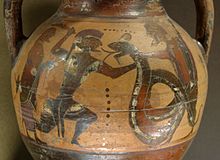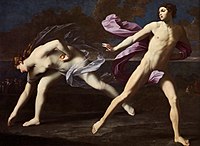用戶:Yuikinuk/希波墨涅斯
希臘神話中,希波墨涅斯(英語:Hippomenes; 古希臘語:Ἱππομένης ),又名Melanion ( /məˈlæniən/; μελανίων 或 μειλανίων)[1],是阿卡狄亞地區安菲達瑪斯[2]或翁切斯圖斯國王梅加魯斯[3]的兒子,獵人阿塔蘭忒的丈夫。希波墨涅斯是喀戎的門徒之一,並且比其他門徒更渴望接受艱難的挑戰[4]。據銘文記載,他是卡呂冬狩獵中,參與圍獵行動的希臘英雄之一[5]。
神話
[編輯]
由偽阿波羅多洛斯[2]、奧維德[6]、塞維烏斯[7]、和希吉努斯[8]敘述的希波墨涅斯求愛阿塔蘭忒的主要神話如下。
希波墨涅斯愛上了善於疾走的女獵手阿塔蘭忒。但阿塔蘭忒並不願結婚,在收到有關結婚的神諭後,她宣佈:想娶她的人必須在賽跑中擊敗她,但是輸給她的人會被立即處死。在另一個版本的故事中,阿塔蘭忒的父親希望她結婚,但她並未順從。她同意與追求者賽跑,因為她認為自己永遠不會輸。
| 希臘神話 |
|---|
 |
| 神明 |
| 英雄 |
| 相關內容 |
|
|
阿塔蘭忒擊敗了所有的追求者,獨獨輸給了希波墨涅斯。但希波墨涅斯並非真正跑贏了阿塔蘭忒,他是靠狡猾取勝的:希波墨涅斯知道,若公平競爭,自己一定跑不過阿塔蘭忒,遂向愛神阿佛洛狄忒求助(而阿佛洛狄忒也不喜歡阿塔蘭忒對愛情的忽視)。
於是,阿佛洛狄忒給了希波墨涅斯三個金蘋果(根據奧維德的記載,這些蘋果來自在塔馬蘇斯和塞浦路斯的神聖蘋果樹 [9] ;而根據塞維烏斯的說法,則來自赫斯珀里得斯的花園)。阿佛洛狄忒要他分三次扔掉蘋果,以分散阿塔蘭忒的注意力。比賽中,希波墨涅斯先後扔掉了兩個蘋果,但阿塔蘭忒再次領先了他;但當她停下來撿拾第三個蘋果時,希波墨涅斯贏得了比賽。他用了所有的金蘋果、拼盡全力奔跑,最終成功贏得了比賽,也贏得了阿塔蘭忒。
在前往希波墨涅斯家鄉的途中,阿塔蘭忒和希波墨涅斯在供奉地母神庫柏勒的一座神廟裏發生了性行為,被庫柏勒變成了獅子作為懲罰(希臘人認為獅子不能與其他獅子交配,只能與豹子交配)。奧維德和塞維烏斯認為,希波墨涅斯曾向幫助他的阿佛洛狄忒承諾,會給她貢品作為回報,但事成之後卻忘記了此事。因此,兩人在庫柏勒神廟停留期間,是阿佛洛狄忒有意讓他們慾火焚身、發生性關係,她知道這會冒犯庫柏勒。庫柏勒(根據許吉努斯的說法,則是宙斯)也確實懲罰了二人,將他們變成了獅子。此後,作為獅子的阿塔蘭忒和希波墨涅斯負責拉着庫柏勒的戰車,塞維烏斯將其等同於地球本身。
根據其他記載,希波墨涅斯是包色諾包伊斯(又譯帕特諾帕奧斯)的父親[10]。還有人說,阿塔蘭忒在與希波墨涅斯結婚之前,曾與戰神阿瑞斯或梅勒阿格生下一子[11]。
備註
[編輯]- ^ "Melanion" is used by Apollodorus, 3.9.2, Pausanias, 3.12.9; "Meilanion" occurs at Xenophon (On Hunting 1.2 & 7); "Hippomenes" occurs in Theocritus, Idyll 3.40; Euripides (as noted in the Bibliotheca l. c.; Euripides' work in question hasn't survived) and in most Roman authors. Ovid in Ars Amatoria (2.188) and Propertius, Elegies 1.1.9, use Milanion, apparently the Latin spelling for "Meilanion". It may have been that Melanion, son of Amphidamas, and Hippomenes, son of Megareus, were two distinct figures appearing in the same role interchangeably.
- ^ 2.0 2.1 Apollodorus, 3.9.2
- ^ Ovid, Metamorphoses 10.605; Hyginus, Fabulae 185
- ^ Xenophon, On Hunting 1.2 & 7
- ^ Corpus Inscriptionum Graecarum 8139 & 8185a
- ^ Ovid, Metamorphoses 10.560–707
- ^ Servius, Commentary on Virgil's Aeneid 3.113
- ^ Hyginus, Fabulae 185
- ^ Ovid, Metamorphoses 10.644
- ^ Apollodorus, 3.6.3; Pausanias, 3.12.9
- ^ Hyginus, Fabulae, 70, 99, 270 for Meleager; Ares suggested as a possibility in the Bibliotheca 3. 9. 2
參考
[編輯]- Apollodorus, The Library with an English Translation by Sir James George Frazer, F.B.A., F.R.S. in 2 Volumes, Cambridge, MA, Harvard University Press; London, William Heinemann Ltd. 1921. ISBN 0-674-99135-4. Online version at the Perseus Digital Library. Greek text available from the same website.
- Gaius Julius Hyginus, Fabulae from The Myths of Hyginus translated and edited by Mary Grant. University of Kansas Publications in Humanistic Studies. Online version at the Topos Text Project.
- Maurus Servius Honoratus, In Vergilii carmina comentarii. Servii Grammatici qui feruntur in Vergilii carmina commentarii; recensuerunt Georgius Thilo et Hermannus Hagen. Georgius Thilo. Leipzig. B. G. Teubner. 1881. Online version at the Perseus Digital Library.
- Pausanias, Description of Greece with an English Translation by W.H.S. Jones, Litt.D., and H.A. Ormerod, M.A., in 4 Volumes. Cambridge, MA, Harvard University Press; London, William Heinemann Ltd. 1918. ISBN 0-674-99328-4. Online version at the Perseus Digital Library
- Pausanias, Graeciae Descriptio. 3 vols. Leipzig, Teubner. 1903. Greek text available at the Perseus Digital Library.
- Publius Ovidius Naso, Metamorphoses translated by Brookes More (1859-1942). Boston, Cornhill Publishing Co. 1922. Online version at the Perseus Digital Library.
- Publius Ovidius Naso, Metamorphoses. Hugo Magnus. Gotha (Germany). Friedr. Andr. Perthes. 1892. Latin text available at the Perseus Digital Library.
- Sextus Propertius, Elegies from Charm. Vincent Katz. trans. Los Angeles. Sun & Moon Press. 1995. Online version at the Perseus Digital Library. Latin text available at the same website.
- Theocritus, Idylls from The Greek Bucolic Poets translated by Edmonds, J M. Loeb Classical Library Volume 28. Cambridge, MA. Harvard University Press. 1912. Online version at theoi.com
- Theocritus, Idylls edited by R. J. Cholmeley, M.A. London. George Bell & Sons. 1901. Greek text available at the Perseus Digital Library.

